News | September 26th, 2018
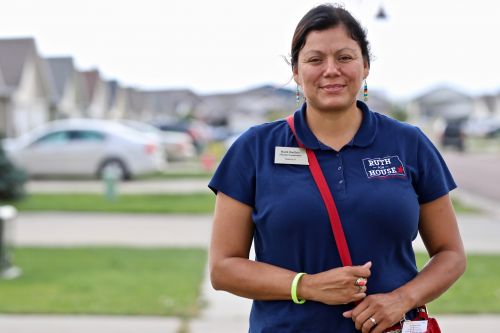
FARGO – Ruth Buffalo’s Nike sneakers are worn treadless. She’s walked hundreds of miles knocking on more than 3,000 doors in South Fargo’s largest district to introduce herself and her bid for a legislative seat in the state’s House of Representatives.
She’s Fargo’s broad-shouldered mother, a kind-eyed, relentless force to be reckoned with, speaking reason while too many others toe parochial lines.
This year a record number of Native women and men are running for office during the midterm elections across the United States. Approximately 60 Natives are running for higher offices this year, 51 for state legislature, and the others for U.S. Congress or other state positions. Sharice Davids, an ex-MMA fighter is running for Congress in Kansas. Peggy Flanagan, a state representative from the White Earth Band of Ojibwe, is running for lieutenant governor in Minnesota. Paulette Jordan, a Democrat, and from the Coeur d’Alene Tribe, is making her bid for governor of Idaho. Deb Haaland, a Pueblo of Laguna, is running for the U.S. House in New Mexico.
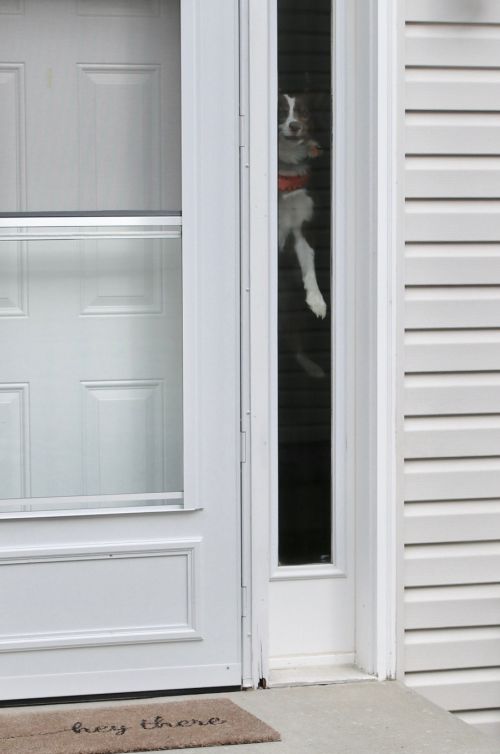
With approximately 37,000 Natives who call North Dakota home, making up 5.4 percent of the state’s population, Buffalo would become the state’s sixth Native elected official since its inception 129 years ago. After nearly a hundred years of attempted colonization, Native Americans were given the right to vote in 1965.
Senators Dan Jerome, and Les LaFountain, from the Turtle Mountain Band of Chippewa were elected in Rolette County before Dennis “Red Cloud” Bercier, who passed away in 2012, served four terms as a state Senator.
Two Native men currently serving are Republican Representative Wayne Trottier, of the Standing Rock Sioux Tribe in Walsh County, and Democrat state Senator Richard Marcellais of the Turtle Mountain Band of Chippewa in Rolette County. No others have been elected before to higher office in the state’s history, according to the North Dakota Historical Society and the North Dakota Blue Book.
Others such as Dr. Michael Yellowbird and Austin Gillette from the Mandan, Hidatsa Arikara Nation and Chase Iron Eyes of the Standing Rock Sioux Tribe have run, but did not win.
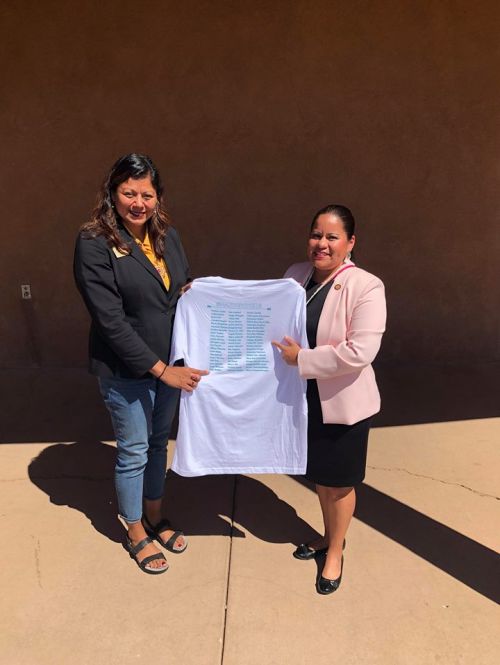
“We need to be at the table,” Buffalo said. “It’s great to have allies and advocates speaking on our behalf because that is needed. No one can tell our story better than we can. The nation-to-nation relationship needs to be fostered and strengthened continuously.”
“But I’m fighting for everyone. Those who are no longer on this earth physically, those who struggle today and those who we will never get to meet physically on this earth, the future generations,” Buffalo said. “The elders who are no longer here encouraged me to lead our communities, either tribal or another way.”
Buffalo, a well-known name after her attempt for the state’s insurance commissioner in 2016, is currently running to represent District 27, South Fargo’s largest district, which has shaped over time and gerrymandering to resemble an obscene hand gesture. The district runs west of I-29 and stretches from West Acres to the townships of Briarwood, Barnes and Stanley.
As a member of the Mandan, Hidatsa Arikara Nation, and from Fort Berthold Reservation, Buffalo has also been active in raising awareness and crafting policy to fight human trafficking. She spoke at the Women’s March in Bismarck in 2016. She stuck her foot in the political door when she ran for insurance commissioner the same year. Although she didn’t win, the race opened her eyes to the possibilities after she secured more than 85,000 votes.
_during_weekends_west_fargo_parade_-_facebook__250-wide.jpg)
With a MBA and a masters in public health degree from the University of Mary, she’s kept her fingers on the pulse of communities from Fort Berthold to Fargo and beyond by keeping active in her tribe’s youth work program, working as a basketball coach for an all-Native women’s team, and on the Native American Commission in Fargo. The National Association of Social Workers North Dakota Chapter has also endorsed her.
Most of Buffalo’s inspiration to seek positive change and save lives comes from family. Born outside of Mandaree, she was raised by a single mother and takes pride in her Native heritage. Her grandfather was a farmer and rancher who fought to keep the family surname in the 1950s. After reservation lands were flooded and the family was forced to split, her grandfather was forced to change the family’s name to a more English-sounding name to find work off the Fort Berthold reservation. Her grandmother was a beadwork artist and quilt maker. Growing up watching her family deal with healthcare issues, she’s now a public health professional.
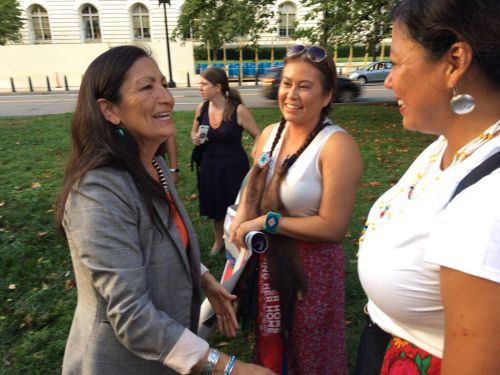
Her family changed the surname back to Buffalo when she was 19.
“When I ran for office in 2016, I ran with my grandfather’s name Buffalo,” she said during a speech on January 30, 2018. “That was a moment of pride. He didn’t have to go through all of that to feed his family. That is why we work so hard today for economic justice, social justice, equal rights and again to be acknowledged as human beings in North Dakota.”
Another inspiration was her sister, Tisa Blackhawk, who died tragically in 2012 during a head-on collision with a drunk driver on Highway 22, once dubbed by Forbes as one of the most dangerous highways in America. They were studying to become doctors in Kansas before she died, but the accident turned Buffalo’s thoughts to politics.
Blackhawk called her “Thanna,” short for Ruth Anna, and whenever the two would take action on local issues Blackhawk would say, “Thanna won that battle that day,” Buffalo said.
“That was tough for us,” Buffalo said. “That was a huge blow, she was our baby.”
Two sisters were in the car at the time of the crash, but one survived, she said.
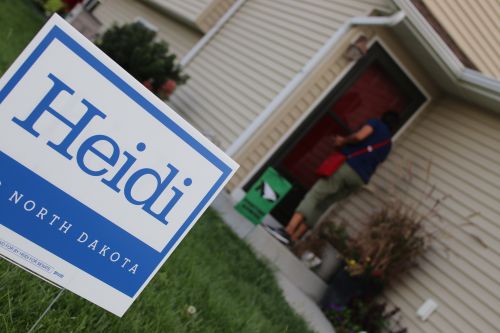
“I called and called the Department of Transportation every day, month after month, until that road was widened,” Buffalo said in the January 30, 2018 speech.
Another elder sister who passed away this past winter also became one of Buffalo’s inspirations, she said.
“She was part of the poor people’s campaign back in the day and met and marched alongside Martin Luther King Jr.,” Buffalo said. “She always told my mom we need Native representation at the state government level.”
Buffalo married her college sweetheart, and has four children.
Buffalo keeps tabs on the current political scene with President Donald Trump’s administration attempting to take away many Native rights to land, the state’s agenda to restrict Native votes with voter ID cards. The so-called blue wave, and the record numbers of women running for public office this year didn’t affect her decision to run for public office, she said.
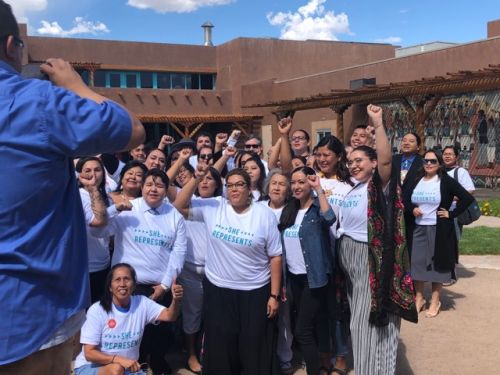
“Those don’t have an impact on me,” Buffalo said. “I don’t know if it’s so much politics the word, as it is I want to serve our community. The way I see it is we need to take a more proactive approach than widening the gap between rich and poor.”
“It seems there are polar opposites in our state, one extreme to the other, almost as if no one wants to have a conversation,” Buffalo said. She wrapped a flier around the door handle of a house with nobody present. A late afternoon humid wind ruffled the pamphlet picturing Quinn Garrick for the state Senate, herself and Jon Kitzman also for the House. She attaches hand-written notes to every flier, a personal touch that requires hours of work from her and volunteers.
“People want to condemn your beliefs, but I want to get to the root cause, working upstream instead of placing more burdens on society.”
Buffalo is running against Republican incumbents Thomas Beadle, with some history of working across the political aisle, and Randy Boehning, a hardliner, who has spent his time in the legislature sponsoring failed bills related to taxes on alcohol, state employee compensation and challenging voters’ rights.
Hitting the pavement and knocking on doors is where Buffalo has gained traction. Few people do not know her name, the North Dakota Democratic-NPL stated. She also has an active Facebook following of more than 4,500 people and frequently attracts hundreds of Likes for her posts thanking people for donations, updating her followers and volunteers on what streets she has covered, or the progress selling “Ruth for House” T-shirts, sold and delivered for $20 each.
In contrast Beadle has 411 people following his Facebook page, and Boehning has no official Facebook page open to the public.
So far, Buffalo has raised approximately $6,000 in campaign donations, she said. She’s spent some on yard signs, and is wondering about renting billboard space, which runs a hefty $3,000 a month.
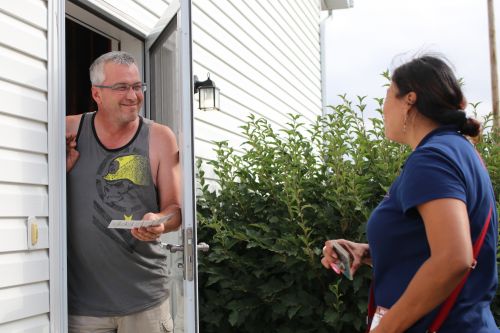
Reflecting her background, Buffalo’s platform is focused on behavioral health services: she wants to ensure that government works for everyone with common sense, not just legislation for the select few. She wants everyone to have access to quality health care and affordable housing and education. She’s concerned about the opioid crisis and what the city and state response will continue to be. Other issues include homelessness, problems affecting working families, gender equality in the work force and mental health issues.
“We know poor health is a result of poor policy,” Buffalo said during the State of Our Union speech on Jan. 30. “Just like I took back our family name, we are taking back our communities, we are taking back the names of our stolen indigenous sisters, the missing and murdered indigenous women whose disappearances we carry with us always.”
She wore a ribbon skirt to the State of the Union speech in memory of Savanna Greywind who was murdered in a fetal abduction case in Fargo in August 2017.
Buffalo was recently part of the group of Native women who traveled to Washington, D.C. to attend the hearing of Supreme Court nominee Brett Kavanaugh. In a letter to the editor to the High Plains Reader, Buffalo and 40 other women urged current U.S. senators Heidi Heitkamp and John Hoeven to vote no on Kavanaugh’s appointment because of his poor record of ruling against Native people’s rights, against affirmative action and ignorance of voter ID laws.
While in the nation’s capital, her group came up against former radio talk show host and conspiracy theorist Alex Jones, the far-right’s fallen Infowars’ swashbuckler, who rallied against them saying Natives came across the Bering Strait and killed each other for 1,000 years.
“Brown KKK go away, brown KKK go away,” Jones said repeatedly.
Moments later, Jones strangely mistook Buffalo’s group for Hispanics, and told them to go back to South America.
The hatred surprised Buffalo, but she’s not going anywhere. “This is my family, this is where I am from,” Buffalo said. “This is what keeps me here. If all the people who want to create change left, who is going to fight to make change?”
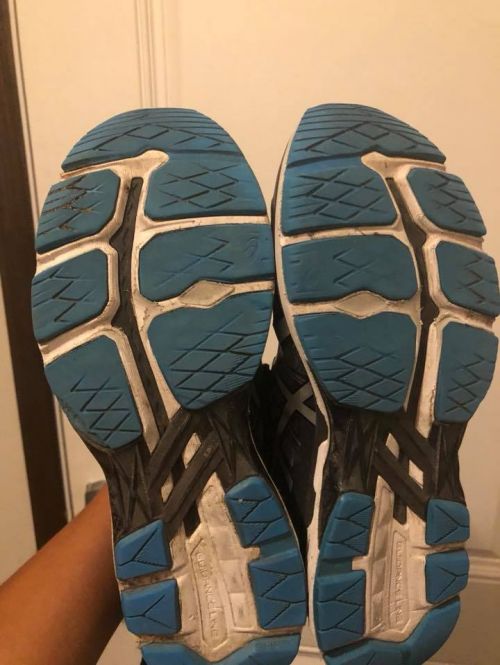
While Buffalo has knocked on more than 3,000 doors, she still has many more to go in South Fargo and plans to hit them all. Besides campaigning, Buffalo is also a consultant for special projects with the First Nations Women’s Alliance, an advocacy group focused on supporting and healing victims of domestic violence and sexual assault, stopping human trafficking and keeping service providers operational.
February 16th 2026
January 27th 2026
January 27th 2026
January 26th 2026
January 24th 2026

__293px-wide.jpg)
_(1)__293px-wide.jpg)


_(1)_(1)_(1)_(1)_(1)__293px-wide.jpg)